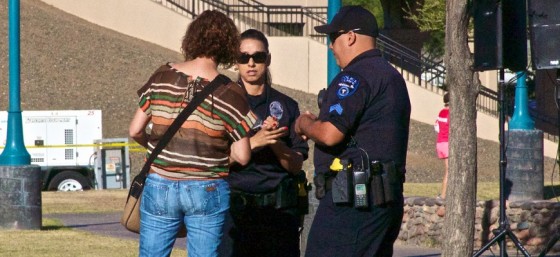My friends called me for clarification this past Saturday morning. They were at Tempe Beach Park where the American Cancer Society’s Making Strides Against Breast Cancer walk was taking place. My friends’ friend was there with another breast cancer organization called Breast Cancer Action. This is a “national, feminist grassroots education and advocacy organization working to end the breast cancer epidemic.”
Breast Cancer Action’s goals are to (1) Advocate for more effective and less toxic breast cancer treatments; (2) Decrease involuntary environmental exposures that put people at risk for breast cancer; and (3) Create awareness that it is not just genes, but social injustices — political, economic, and racial inequities — that lead to disparities in breast cancer outcomes.” They have a Think Before You Pink campaign to ban toxic chemicals found in “pink” products aimed at increasing breast cancer awareness.
The group brought their petition to the American Cancer Society’s walk at Tempe Beach Park and was asking for signatures. Given that my friends’ called me at 10 a.m., I don’t think the Breast Cancer Action group solicited signatures for long before they were asked to leave. Tempe Beach Park is a public space and these volunteers weren’t doing anything illegal. My friends wanted to know whether the officers had the authority to tell this group to stop what they were doing or leave.
In this situation, the police probably had the authority to make the Breast Cancer Action people stop petitioning. The American Cancer Society had a permit for their event in the park so they had a greater say over what activities could go on in the space they were permitted to use for their walk. If the Breast Cancer Action people were soliciting signatures within those boundaries, the walk organizers could make them stop or leave. The petitioners could have stood on public property outside the boundaries stated in the permit and continued to solicit signatures as long as they weren’t breaking any other laws like harassment, disorderly conduct, blocking a thoroughfare, etc.
This scenario reminded me of the P.F. Chang’s Rock ‘n’ Roll marathon and half-marathon in January. The routes take runners through the streets of Phoenix, Tempe, and Scottsdale. The race organizers get permits to close the public streets, or at least lanes, along the route. The race has a strict “No Bandits” rule. You must be wearing a race number to run in the race. If you’re not wearing a number, you’ll be kicked off the route and possibly arrested for trespassing. If you’re a jogger who didn’t register for the race, you can’t decide to take advantage of the streets being closed and jog on the race route that day. The race organizers have the permit for the area so they set the rules regarding who can and can’t be on the race route that day.
So that’s why groups who get permits for their events have more say over who can be there even when the event is in a public park or a public street. When you have the permit, you set the rules. If you want to chat with me about this or any other topic, you can connect with me Twitter, Google+, Facebook, YouTube, LinkedIn, or you can email me.
You can also subscribe to the Carter Law Firm newsletter.
Please visit my homepage for more information about Carter Law Firm.


